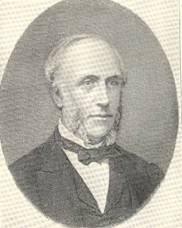
|
|
| Date Published: |
L’Encyclopédie de l’histoire du Québec / The Quebec History Encyclopedia
George Brown
Return to the George Brown homepage Brown,
George (1818-1880), journalist and statesman, was born at Alloa, near
Edinburgh, Scotland, on November 29, 1818, the son of Peter Brown and
Isabella Mackenzie. He was educated at the High School and at the Southern
Academy, Edinburgh; and in 1838 he migrated, with his father, to the
United States. In 1842 the father and son founded in New York the British
Chronicle (1842-43); but in 1843, finding New York uncongenial,
they removed to Toronto, and founded there the Banner (1843-44),
a weekly paper for Presbyterian readers. This was succeeded in 1844
by the Globe, a political journal, of which George Brown became
the editor and guiding spirit. First as a weekly, then as a In 1851 Brown was elected to the Legislative Assembly of Canada as a Reform member from the county of Kent. In the assembly he played at first a lone hand: he opposed the Hincks-Morin administration, and he refused to coalesce with the "Clear Grits." But his advocacy of representation by population, and his campaign against French-Canadian and Roman Catholic [alleged] domination in Canada, eventually made him the most outstanding Reform leader in Upper Canada ; and when the Macdonald-Cartier government resigned in 1858, he was called upon to form an administration. With A. A. Dorion he formed the short-lived Brown-Dorion government (August 2-6, 1858) He stood aloof from the S. Macdonald-Sicotte and S. Macdonald-Dorion governments of 1862-64; but when the second Taché-Macdonald government fell in June, 1864, and the "Great Coalition" was formed to bring about Confederation, he was included in it as the chief representative of the Reformers. In October, 1864, Brown played a prominent part in the Quebec Conference; but in December, 1865, he resigned from the government, before Confederation was completed, through inability to work in harmony with his colleagues, and particularly with John A. Macdonald, between whom and himself there had been for years a bitter personal enmity. Thereafter he played little or no part in parliament. In the first elections to the Canadian House of Commons, in 1867, he was defeated in South Ontario ; and though he was appointed to the Senate in 1873, he spoke seldom in that house. In the country, however, he remained a force to be reckoned with. He was regarded as the power behind the Mackenzie administration of 1873-78; and he was certainly the extra-parliamentary leader of the Liberals who, in 1871, drove Sandfield Macdonald from office in Ontario . Brown was a great journalist and a dominating personality. As a politician, his actions did not always square with his pretensions; and his editorship of the Globe was, as Goldwin Smith said, "a long reign of literary terror." But sometimes, as in 1864, he was capable of taking really statesmanlike views. He died in Toronto, on May 9, 1880, from a bullet wound inflicted by a discharged employee. In 1862 he married in Edinburgh Anne (d. 1906), daughter of Thomas Nelson, the publisher; and by her he had two sons and three daughters. See A. Mackenzie, Life and speeches of the Hon. George Brown (Toronto, 1882), and J. Lewis, George Brown (Toronto, 1906). [Consult the biography of Brown at the Canadian Encyclopedia and at the Dictionary of Canadian Biography.] Return to the George Brown homepage Source : W. Stewart WALLACE, ed., The Encyclopedia of Canada, Vol. IV, Toronto, University Associates of Canada, 1948, 400p., pp. 313-314.
|
© 2005
Claude Bélanger, Marianopolis College |
|
 bi-weekly,
then as a tri-weekly, and lastly as a daily, the Globe, under
Brown's management, set a new pace in Canadian journalism; and before
long it had earned for itself a political influence in Upper Canada
such as no other journal has ever possessed.
bi-weekly,
then as a tri-weekly, and lastly as a daily, the Globe, under
Brown's management, set a new pace in Canadian journalism; and before
long it had earned for itself a political influence in Upper Canada
such as no other journal has ever possessed.